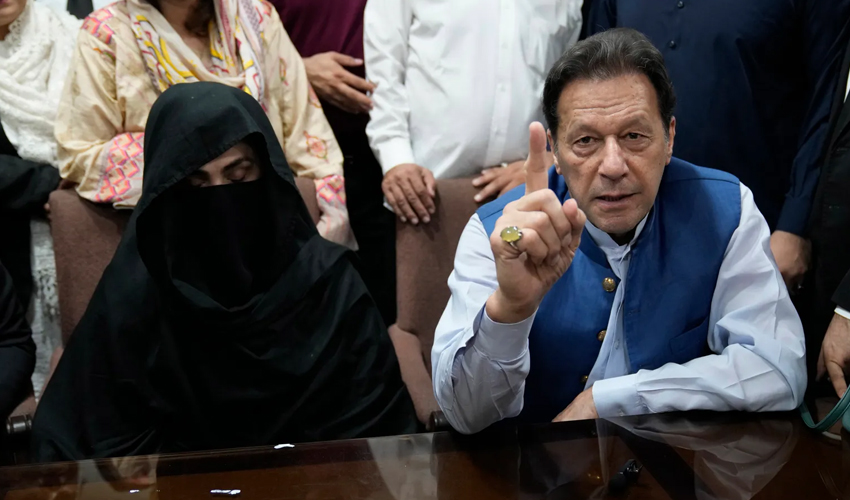ISLAMABAD: The District and Sessions Court Islamabad has accepted former Prime Minister Imran Khan and his wife Bushra Bibi appeals and acquitted them in the iddat case.
Additional Sessions Judge Afzal Majuka announced the reserved short verdict. The court set aside the verdict of the trial court that sentenced seven years imprisonment to Imran Khan and Bushra Bibi, and ordered release of them.
Both applications of the prosecution have been rejected. “If he is not required in any other case, the PTI founder should be released,” the court ordered.
The judge had reserved the verdict earlier today after hearing the central appeals against the sentences of Imran Khan and Bushra Bibi for getting married during her iddat period after her divorce from her former husband Khawar Maneka. Arguments were presented by Khawar Maneka’s lawyer Zahid Asif and Imran Khan’s lawyer Salman Akram Raja.
Maneka’s lawyer emphasized that during the trial, the lawyers for PTI founder Imran Khan and Bushra Bibi said they had to present witnesses. “If they want to bring witnesses, then we have no objection. The court can take evidence at any time,” said Asif.
He also argued that Mufti Saeed did not confirm that both parties adhered to Hanafi principles.
Salman Akram Raja, representing Imran Khan, argued that his client had got married and was unaware of the iddat, adding that the entire responsibility was being placed on Bushra Bibi.
“The husband is keeping aside the woman’s sacrifices and saying he has not done anything,” the lawyer stated, arguing that the woman stood with her husband in difficult times, so this wasn’t expected of a leader.
“The wife left the luxuries of Bani Gala and got herself transferred to Adiala Jail. What will she think she has got in exchange for her love?” the lawyer questioned. Judge Majoka remarked that if the marriage did take place, both parties bear responsibility.
Maneka’s lawyer argued that Bushra Bibi’s lawyer highlighted that a verbal divorce had been allegedly given in April 2017, adding that Salman Akram Raja is accepting the divorce in April.
“If the woman says that she was given a verbal divorce, will her verbal statement be trusted?” Asif questioned, pointing out that verbal divorce has no significance and there were court judgements in this regard. “The law gives precedence to documentary evidence over verbal.”
Asif further argued that Bushra Bibi’s testimony did not explicitly deny that the marriage took place during iddat. He noted that Mufti Saeed performed the nikah after Bushra Bibi’s sister confirmed that all essentials of the marriage were complete. Bushra Bibi did not tell Mufti Saeed her iddat was complete and the sister who claimed so should have been presented as a witness.
The judge commented that it was the prosecution’s duty to prove that the iddat period was not complete.
Bushra Bibi’s lawyer stated that they only sought a decision based on merits, complying with the Islamabad High Court’s directive, and not for it to be remanded back. The judge remarked that the case was remanded because the certificate was not initially presented.
Lawyer Asif recalled that Bushra Bibi was indicted on January 16, 2024 and she pleaded not guilty. She, her lawyer or Imran Khan did not say the nikah was solemnized on the completion of iddat. Her lawyer responded that her reply can be found in question number 2 of her statement, recorded under Section 342 of CrPC.
Khawar Maneka’s lawyer reiterated the traditional Islamic period of iddat, stating, “If the husband dies, the wife’s iddat will be four months. If triple divorce has bene given, it will be considered one. When a complainant stated on oath that he wanted recourse, it would be treated as one divorce, he argued.
He further said that Imran Khan and Bushra Bibi were the best witnesses in this case, adding they could have testified in their favour on oath. He further said that it was alleged the divorce deed had been tampered with but no evidence presented, and asserted no divorce was given in April.
He said further that Khawar Maneka gave written divorce in November 2017. The holy Quran mentions the right to recourse during the period of iddat and second marriage is allowed after the completion of iddat not during this period.


